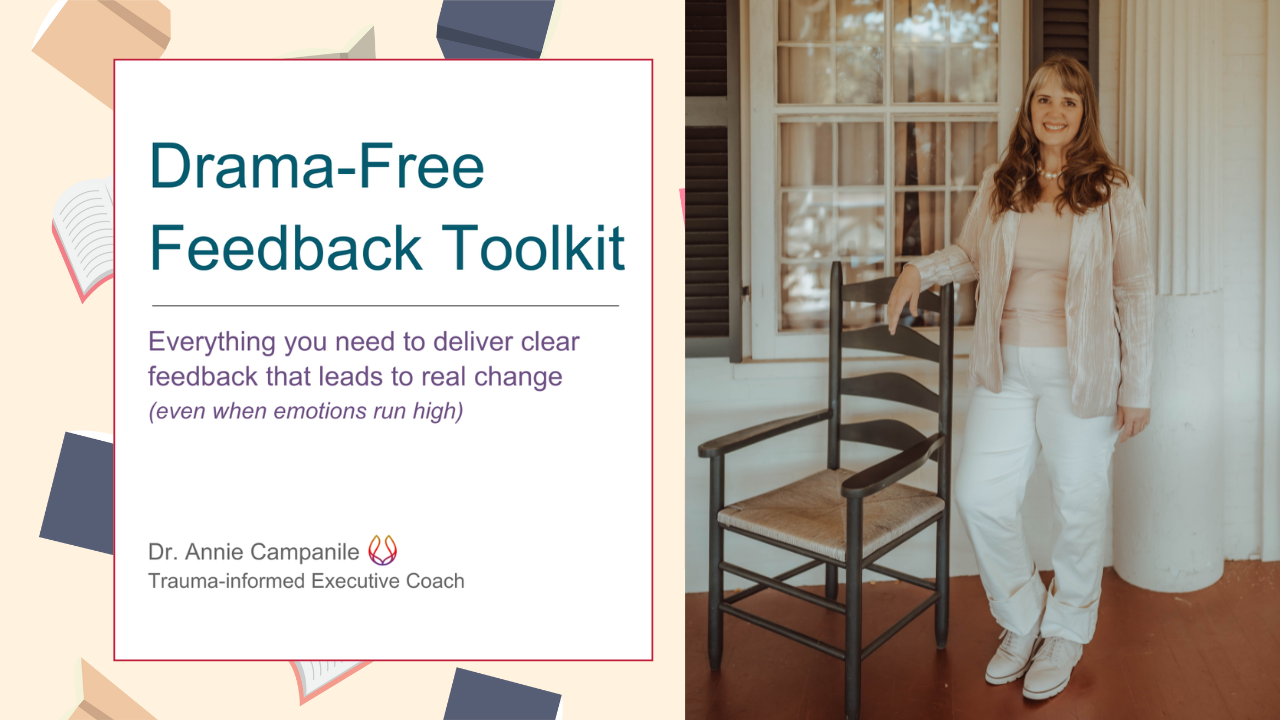Ep 16: How to Stop Being Overworked - without Risking Your Career
Apr 30, 2025
Is your work ethic secretly working against you?
When you're the person everyone relies on, it can feel impossible to say No — especially when it feels like your career, reputation, or relationships are on the line.
You take pride in being dependable and driven. But when that strength turns into an unspoken agreement to always do more, it can leave you overworked, under-appreciated, and resentful.
If you're tired of feeling stretched too thin — and ready to stop being the "go-to" person for everyone else’s workload — this episode is your turning point.
I’m sharing The Power Shift, a simple yet powerful technique to help you:
- Recognize when your work ethic is being used against you
- Set boundaries without guilt, fear, or confrontation
- Reclaim your time, energy, and confidence — without risking your career
Try The Power Shift Today:
Ask yourself these two transformational questions:
- Where have I been using my power to avoid conflict?
- How can I use that same power to take care of myself instead?
The Power Shift can create big results, but knowing how to apply it is key.
🎧 Tune in to hear how my client Lisa used this exact practice to break free from years of being overworked and undervalued, and how you can start doing the same thing.
In This Episode, You’ll Discover:
✅ The hidden reason you keep getting more work (and how to change it)
✅ Why high-achievers and people pleasers struggle to set boundaries — especially after trauma
✅ How to shift from feeling trapped to empowered using two simple questions
✅ How to protect your wellbeing and your professional reputation without conflict
Want More Support?
Download your FREE Trauma Survivors Empowerment Guide — packed with practical tools to reduce anxiety, speak up with confidence, and set boundaries that feel good.
👉 Grab it here https://www.anniecampanile.com/sensitivity-into-strength
Next Week: We’re exposing what happens when workplace stress flips from people-pleasing to fight mode — and how to use your voice without turning every conversation into a battle. Don’t miss it!
TRANSCRIPT
Episode 16: How to Stop Overworking without Risking Your Career
[00:00:00] How can you stop being overworked when it feels like everything and everyone depends on you? Sure, you take pride in your strong work ethic. It's how you've earned trust, built your career, and become the person everyone relies on. But sometimes that same strength can lead to your suffering - feeling overworked, underappreciated, and burned out, especially when people pile their work onto your plate because they know you won't push back.
If your reliability is being taken for granted and you're ready to break that cycle, this episode will show you how. I'm sharing a powerful technique to stop letting people take advantage, so you can protect your time, your energy, and your wellbeing without damaging your reputation or your relationships.
[00:01:00] Have you ever wondered why you are the one who always works late? The reliable one that everyone counts on, yet somehow the one whose needs come last? Here's an idea that might feel a little uncomfortable at first, but stay with me: When someone repeatedly takes advantage of your reliability or your strong work ethic, on some level, you are agreeing to that behavior.
This doesn't mean that you deserve to be treated badly or taken for granted. You don't, ever. But you do have power and you might be using it in a way that you didn't realize.
Here's how this can happen. If your generosity or strong work ethic earned you approval from a critical parent, or shielded you from criticism, or gave you a sense of control when life felt chaotic, your survival brain might have learned that overextending [00:02:00] yourself is what keeps you safe.
That it's just the price you have to pay for acceptance or to avoid conflict. So when your boss drops an urgent assignment at the end of the day, or a client asks for just one more thing without offering to pay for it, something inside of you automatically says, “Just do it. Don't upset them.”
It's like having a superpower that works against you. Because your ability to do great work keeps you getting more work to do!
So how do you break free from being overworked and undervalued, without putting your career or reputation at risk? Let me answer that by sharing the story of my client, who, let's call Lisa.
When she arrived at my office for her first coaching session, Lisa bitterly complained, “Once again, my boss intimidated me into claiming fewer hours than I actually worked. He's such a jerk!”
Lisa described how her boss had demeaned her and underpaid her for years, intimidating her so that she would not complain to human [00:03:00] resources.
While she was speaking, I noticed Lisa's hands curled into tight fists. Her voice trembled and she kept her eyes focused down at the floor. I could see that Lisa was in pain, mentally, physically, emotionally, and even spiritually. It was no wonder though, because after all, if it were true that she was a victim of her boss's behavior, then she was powerless.
To help ease a little bit of her pain, I invited Lisa to pause for a moment and take a few deep breaths. Then I surprised her by saying, “Let's shift our focus away from your boss for a moment. Does this situation feel familiar to you? Can you think of other times when someone took advantage of your strong work ethic, or is this the first time?”
Lisa sat back and thought for a moment, and then she said, with sudden clarity, “Actually, every boss I've ever had has treated me this way. I'm sick of it.” I saw that as a turning point and I said, “Good. I think you're ready [00:04:00] to own your power.” “My what?” She asked. “Your power, Lisa.” I said, “You have the power to change your agreement with your boss, regardless of whether or not he changes his behavior toward you.”
Lisa seemed frustrated that I would not join her in criticizing her boss, but I knew that that wouldn't help her. It would just reinforce her perception that he had all the power. So I told her, “Every challenging relationship will get worse until you own your part and take back your power.”
Lisa said she felt nervous because she was afraid of how her boss would react if she stopped working overtime for free or, even more boldly, if she reported what he was doing to human resources.
I told her I could absolutely understand why she felt nervous. And I said, “When we're used to silencing ourselves to keep the peace, it can feel really frightening to speak our truth and allow others to take responsibility for themselves, rather than trying to do everything we can to make sure that they don't get upset.”
[00:05:00] I told her, “Your part of this situation belongs to you. It's not your job to keep your boss happy or protect him from the consequences of his actions.”
I was struck by the transformation that already began happening as I talked with Lisa. Her face regained color. She sat up more straight in her chair, and she looked me in the eye when she said, “You know what? You're right. I am ready. How do I do it?”
That's when I guided Lisa through a simple practice that I call the power shift. Here's what it looked like: I invited Lisa to close her eyes or look down, take two full breaths, and then bring the situation with her boss to mind - not the whole story, because that could get overwhelming. Just one part where she felt really frustrated or powerless.
Then I guided her to answer the first question of the power shift, and that is Where in this situation have I been using my power to avoid conflict?
Lisa's eyes remained [00:06:00] closed while she thought for a moment, and then she whispered “By staying silent.”
Then I gave Lisa the second question to the power shift: What would it look like to use that same power to take care of myself instead?
After pausing for a moment, Lisa looked up and she said, with a really clear voice, “I would tell the truth. I would stop pretending that I'm okay with working more hours than I claim on my time sheet.”
That was the moment when Lisa began owning her power. Not through confrontation or retaliation, but through a simple conscious awareness of her ability to choose, she no longer felt trapped.
She no longer felt like a victim. The following week, Lisa turned in her resignation, reported her boss to human resources, and accepted an offer for a better job all in one day. She could barely believe it, but that is exactly what happened when she used her power to take care of [00:07:00] herself. And now it's your turn.
I invite you to try the power shift this week. Here are the steps:
- First, ground yourself with two or three full breaths.
- Then think of a situation where you feel overworked or underappreciated, or you feel resentful, and ask yourself, Where in this situation have I been using my power to avoid conflict?
- And then ask yourself, How could I use that same power to take care of myself instead?
Now, I know that avoiding conflict might actually seem at first like that's a way that you take care of yourself. But with this exercise, we're wanting to go a little deeper than just that survival level of taking care of ourselves.
Once you recognize how you've already been using your power, you can choose how to use it differently, one moment at a time, and that's how real transformation begins.
You don't need to overhaul your life in one week or make any dramatic changes like Lisa did. It is just that [00:08:00] she was ready for that after 12 years of suffering under that former boss, like she suffered for a long time. So when she finally acknowledged that she had power, ooh, she was ready to use it.
Thank you so much for joining me for another episode of Heal Your Trauma Find Your Voice. If you love this episode, share it with someone else who's tired of being overworked.
And if you're ready for more practices like this, download my free Trauma Survivors Empowerment Guide. You'll find the link in today's show notes. It's a great next step if you're ready to reduce your anxiety, speak up with confidence and set boundaries that feel good to you.
Next week I'm exposing a burden so many high achievers quietly carry, especially if you've lived through trauma. We're diving into what really happens when workplace stress flips from people pleasing to constant fight mode, and every conversation feels like an attack on your time, your authority, or your peace of mind.
If you've ever felt a surge of irritation before snapping at a colleague or asked yourself, “Why [00:09:00] does every day feel like a battle?” Be sure to tune in.
I’ll show you how to recognize when your fight response is running the show and how to use your voice without turning every conversation into a confrontation.
Because you deserve more than constant stress at work, and you really can have that. Until then, I'm Dr. Annie Campanile reminding you that healing is possible, and you don't have to do it alone. See you next time.


